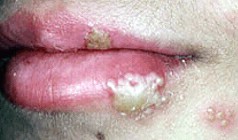|
Herpes is a viral infection of the skin caused by the Herpes Simplex Virus (HSV). There are two varieties of the virus. HSV-1 causes mouth and lip rashes, or cold sores. HSV-2 causes genital herpes. Either strain of this virus can cause either type of herpes, although 75% of genital herpes is caused by HSV-2.   GENITAL HERPES One in every five people have, or will have, genital herpes. Symptoms of genital herpes include fever, headache, muscle aches, and rashes, which may also be accompanied by painful blisters and ulcerations of the skin. Glands in the groin area may become tender and swollen. After a few weeks most of the symptoms will disappear. 50% of those infected will show no significant symptoms ... many people can have the disease without knowing it! Unfortunately, the virus symptoms (if there were any) disappear, but the disease itself stays in your body, recurring every few months (although not as severely) for the rest of your life. Herpes is spread by skin-to-skin contact. Most exposure happens when there is no identifiable rash, either because the symptoms have disappeared temporarily, or because there are no visible symptoms at all. Because sexual intercourse isn't necessary to spread the disease, there is no sure way to avoid it other than abstinence. High-risk behaviours (unprotected sex, or protected sex with many different people) can greatly increase the chances that you will get this disease. Babies delivered through the birth canal of an infected woman can become infected if the mother has the disease, most especially if the disease has flared up during delivery. This can cause a whole-body and brain infection in the baby, with a high death rate. For those babies that live, the result is often mental retardation and blindness. To avoid these complications, women who are experiencing a recurrence of the symptoms of herpes give birth by Cesarean (C-section) delivery. Like most viral infections, there is no cure for herpes. Some medications can lessen the symptoms of the disease, and shorten the duration of the outbreaks. Currently (2022) there is a new vaccine which is under development that shows promise for preventing the disease in women. GONORRHEA | GENITAL WARTS | LICE & CRABS | SCABIES | HEPATITIS | HIV/AIDS |